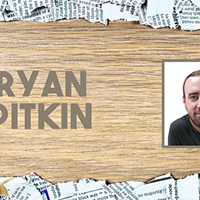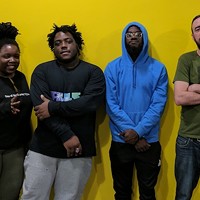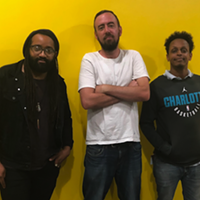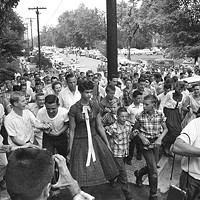Police presence in CMS schools has increased 300 percent in 10 years
But it's positive influences — not cops — we need.
By Ryan Pitkin @pitkin_ryanDeforeyea Walker, 17, sits outside his west Charlotte home after just completing another year of high school. A puppy tied to a thin rope jumps playfully toward anyone who gets close in the patchy front yard. Walker looks on as he discusses his relationship with police, specifically the ones he has had run-ins with at school.
"I didn't like police before, and I still don't. They think that because they have a badge they can say whatever they want or search you whenever they want. Even if they just say 'what's up' to me, it's not all good. Just from the way they smile, they look down on me."
The increase in police officers in Charlotte-Mecklenburg schools, known as school resource officers, or SROs, has nearly tripled since 2004, going from 18 to 49. Meanwhile, the overall student population has increased by 18 percent.
Eighteen to 49 might seem like a modest hike, but experts say it's on the extreme end of a trend that's taken over nearly every school in the U.S.
SROs are in middle schools and high schools. Most have one SRO, but those schools that typically see more incidents of crime can have two. The district also utilizes officers through the Charlotte-Mecklenburg Schools Police Department, one of only two police agencies run by school systems in North Carolina. The CMS Police Department employs 12 patrol officers and four detectives, all sworn law enforcement officers with the power of arrest, and controls the over 100 security personnel working on campuses throughout Mecklenburg County.
Watchdogs say officers in schools create a negative learning environment for children who harbor distrust of police because of past experiences with profiling or other negative experiences.
Many students, including Walker, say they feel intimidated by police in schools. Some even say SROs harass them on their way to class.
Walker's involvement in several fights burned a bridge with his school's resource officer and quickly made him a target. Walker said he was regularly searched during his first two years in high school and told that it was because he looked high.
"Whenever I ran into him, it was never for any good reason," Walker says. "Police have never helped me do anything in life. I don't have any relationship with any police at my school."
The Justice Policy Institute, a national nonprofit organization that researches justice policies nationwide and pushes for reform, is a long-time advocate of the removal of police officers from schools. Marc Schindler, Justice Policy's executive director, offers three reasons: the criminalization of normal teen behavior, the misuse of public resources, and the creation of an unsafe environment. The institute's research has found that the presence of police does not create a safe feeling for children, especially those who have grown up in low-income, crime-stricken areas.
Speaking over the phone from Washington, D.C., Schindler said that police presence in schools began beefing up across the country at the beginning of the 21st century, when the media became obsessed with school shootings, leading parents and administrations to believe their students were less safe. The odds of being involved in a school shooting are about the same as being struck by lightning.
Schindler called the increase of police in Charlotte-Mecklenburg schools "on the very extreme side" compared to other districts.
"Our research says that kids feel safer in a nurturing environment where they have someone to talk to," Schindler said. "If you're in an environment where you don't feel safe then your behavior will reflect that. I'd rather have a counselor than a police officer in my kid's school."
School resource officers are police sworn in by the CMPD who volunteer for school duty. They go through a selection process in which their background is checked for, among other qualifications, the sort of work they have done with children. SROs are supposed to stay out of disciplinary issues unless a clear crime is committed. In the event of a crime, SROs may arrest, release a student to the custody of a guardian, or force a student to leave campus. Most incidents that involve police often involve a suspension. Randy Hagler, CMS Police Department chief, says the department wants to create a safe environment in schools.
"The police try to stay out of the disciplinary part of it," he says. "If we can still provide a safe environment on campus through the school staff taking disciplinary action then we want to do that. Occasionally there's a situation that's so egregious it has to be handled through arrest. We try to limit that, but sometimes it has to be handled that way."
While the number of crimes reported in schools has remained steady over five years, hovering between 1,400 and 1,600, arrests are down. School resource officers sometimes offer students an alternative to arrest: entering a diversion program. This has helped bring down the number of juvenile arrests, which was a huge problem only six years ago. About 990 arrests were made during the 2007-08 year. During the most recent school year, officers made 511 juvenile arrests in CMS schools.
Sgt. Celestine Ratliff, leader of CMPD's School Resource Unit, says resource officers are encouraged to build relationships with youth and that some mentor through programs, including CMPD's Right Moves for Youth, or help coach some schools' athletic teams. Ratliff never responded to emails that asked how many of the district's 49 SROs participate in such programs.
FROM THE TIME Walker was 12, he was in and out of juvenile detention centers on charges including grand theft auto and larceny. He said that as he reached the age of 16, when he could be charged as an adult in North Carolina, his probation officer referred him to LIFT Academy, a life-skills program run by Charlotte-based non-profit Youth Development Initiatives. Youth Development Initiatives takes referrals from SROs and juvenile court counselors and attempts to help troubled and at-risk youth finish and become ready for life outside school.
Since it began in 2008, LIFT's after-school program has helped 91 percent of enrollees improve grades during their first semester of participation and has kept kids attending school for 40 more days on average than they had during previous semesters. The grade point averages of participants rise, on average, by almost a point.
Walker reluctantly entered the program, but within two to three weeks he was thriving, spurred along by a program manager, Dee Rankin, who worked closely with him.
"Rankin saw that potential in me," says Walker.
Darryl Bego, founder and president of Youth Development Initiatives, meets with school resource officers before the start of the school year to explain the student referral process. He says he thinks the officers belong in schools but wishes he had more of an opportunity to interact with them, to train them on ways to have more of a positive impact on kids' lives.
"I would train them as site-based mentors instead of just posted soldiers in the hallways," Bego says. "You're engaging resources that are going to be at the school already. But it has to be strategic, it has to be relevant to the kids or the kids won't buy it." Officers are able to take part in YDI if they so choose. Ratliff works closely with some of its programs, showing up on weekends out of uniform.
The program offers kids pre-paid gift cards when they begin achieving goals. It's a bribe, but an effective one. Walker attributes the program to what he calls the total 180 of his life, the point from which he began to turn things around.
Rankin and others on staff helped Walker land his first job, at a Habitat for Humanity ReStore, only after he began passing all of his tests with flying colors. He is still employed at the store. He remembers receiving his first paycheck and the feeling of vindication and stability it gave him.
Since joining YDI in March 2013, he has seen his grades rise. He's even landed on the honor roll. He hopes to join the Air Force after finishing high school or to study biomedical engineering in college.
"I never was out robbing people because I wanted to be," Walker says. "I always did it to support my family. That first paycheck was a good feeling. It felt so much better than going out and taking something some other man had earned."
Speaking of...
Latest in News Feature
More by Ryan Pitkin
-

You're the Best... of Charlotte
Oct 27, 2018 -

Listen Up: Cuzo Key and FLLS Go 'Universal' on 'Local Vibes'
Oct 25, 2018 -

Listen Up: KANG is Back and Bla/Alt on 'Local Vibes'
Oct 18, 2018 - More »
Calendar
-

Queen Charlotte Fair @ Route 29 Pavilion
-

NEW WINDOW GALLERY-Pat Rhea-ACRYLIC PAINTINGS-April 05-30 2024 VALDESE, NC 28690 @ New Window Gallery/Play It Again Records
- Through April 30, 12 p.m.
-

TheDiscountCodes
-

"Blood Residue Analysis of Paleoamerican Stone Tools in the Carolinas" @ Native American Studies Center
- Fri., April 26, 12-1 p.m.
-

Brightfire Music and Arts Festival @ GreenLife Family Farms

















